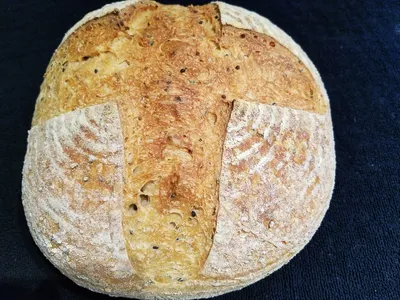A Spoon Full of Lovin'
Artisanal Sourdough Breads
Sourdough Recipe Using 100% Hydration Method
ARTISAN SOURDOUGH BREAD RECIPE
USING A 100% HYDRATION METHOD
· Keep in mind that wherever you keep the starter/levain/dough,
[unless it’s in the fridge] the temperature should be between 80⁰ and 84⁰
· Use King Arthur Sir Galahad Artisan Flour for feeding the levain
· Use Bob’s Red Mill Artisan Flour for making the dough
· Use distilled water and keep it at room temperature
DAY ONE
FEEDING SCHEDULE [same day every week if possible]:
· Feedings should be about 4 hours apart
· Use King Arthur Sir Galahad Artisan Flour for feeding the levain
1st Feeding:
100 grams starter
200 grams water
200 grams flour
2nd Feeding:
200 grams water
200 grams flour
3rd Feeding:
Same as 2nd Feeding
4th Feeding:
Same as 3rd Feeding
· After the 4th feeding, let autolyze overnight in a warm room
· Keep the levain loosely covered
DAY TWO
MAKING THE DOUGH:
260 grams levain
500 grams water
· Once the levain and water is mixed together in the Kitchen Master bowl, add one of the following:
½ cup pour le pain
3 tbls. dried rosemary and 2 tbls. dried garlic
4 tbls. roasted sesame seeds
½ cup chia seeds
½ cup molasses and ½ cup wheat germ
½ cup kalamata olives. . .
· Be creative!!
· Then add the flour
965 grams Bob’s Red Mill Artisan Flour
· Use the Kitchen Master for a few minutes, just until dough does not stick to the sides of the bowl
· Cover and autolyse for 20 minutes while still in Kitchen Master bowl
· While dough is autolysing, feed the leftover levain 100 grams water and 100 grams of flour and let it autolyse [covered] in the proofing room for 1 hour before it gets put back in fridge until next week (covered tightly)
· After dough has autolysed 20 minutes, add 4½ tsps. finely ground Pink Himalayan salt
· Mix the Himalayan salt into the dough with the Kitchen Master for a couple of minutes
· Lightly dust work surface with flour and [using envelope method] knead dough for a couple of minutes
· Turn dough into a lightly oiled non-metallic bowl [bottom side up], flip it and cover with saran wrap, put back in proofing room for about 3 hours or until doubled in size
· I would suggest using a Marks A Lot or Sharpee, write the time on the Saran Wrap you put the dough in the proofing room
· Turn dough onto floured work surface and cut in half
· Knead each piece of dough [envelope style] for a minute or so and shape into boules or batards
· Cover and let autolyse for 15 minutes
· Turn boules or batards into bannetons dusted with white rice flour
· Cover with saran wrap and secure with rubber band
· Again, mark the Saran Wrap with the time you made the boules
· Return to proofing room until doubled in size
· Then put in refrigerator to retard until following morning
· Retarding should be between 8 and 12 hours
· Refrigerator temperature should be set at 50⁰
DAY THREE
MAKING THE BREAD
· Preheat oven and cast iron dutch oven to 450⁰ for an hour or so
· While the oven is preheating, take out one of the boules or batards so it can reach an internal temperature between 57⁰ and 60⁰
· Put a piece of parchment paper on a baker’s peel
· Dust the parchment paper with white rice flour
· When boule or batard has gotten to the correct temperature, carefully invert it onto the parchment paper
· Dock the boule or batard so that the gasses can escape.
· Again, be creative.
· Carefully, take the dutch oven and place it on the counter
· Invert it so that the “top” is lying on the counter
· Take the “bottom” and set it out of the way on a counter
· Gently slide the boule or batard onto the “top/lid” of the dutch oven
· Lower the oven temperature to 400⁰
· Cover the boule or batard with the bottom (larger portion) of the dutch oven and quickly return to the oven and bake for 20 minutes
· After 20 minutes, take the bread out of the oven and uncover it
· Return to the oven and bake until it reaches a temperature of 210⁰ and it nicely browned [about 15 minutes to 20 minutes]
· Remove from oven, set on a cooling rack and let it cool for an hour or so.
· Set the temperature of the oven back to 450⁰
· Return the dutch oven back to the oven
· Take the second boule out of the fridge and repeat the same instructions for baking the second boule.
